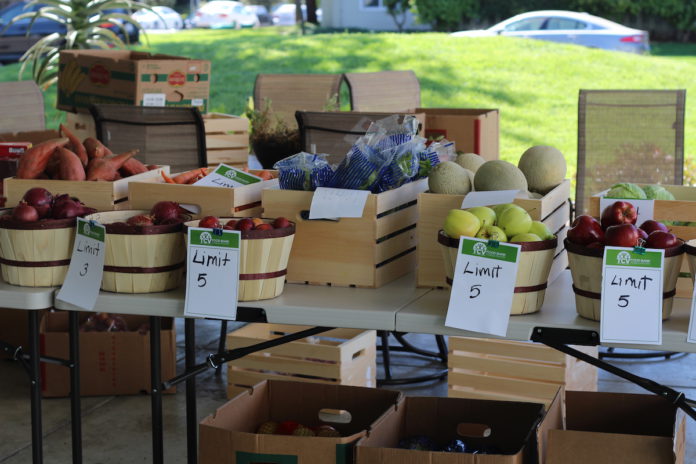For 54 years, the Tri-City Volunteers Food Bank and Mobile Pantry (aka, TCV Food Bank) in Fremont has united farmers and families in need. But a recent Mediterranean Fruit Fly epidemic has put a pause on the distribution of homegrown goods, severing a longstanding connection between local growers and the community they nourish.
“People would just show up with a truckload of food, that was the beautiful thing about this place,” said the food bank’s executive director Linda Leu.
The Medfly infestation began in August with the detection of a single female fly in Fremont, prompting the USDA and California Department of Food and Agriculture (CDFA) to institute a quarantine. This measure prohibits the transport and distribution of over 50 types of homegrown “host” fruits, including apples, pears, peaches, plums and tomatoes. While food banks like TCV Food Bank can still receive shipments from large commercial farms, the quality often falls short of produce from local farms, which is fresher, more nutritious and less likely to be treated with harmful herbicides.
Adopting a client-choice model, TCV Food Bank prioritizes providing luxury service for its consumers. Stepping inside feels like entering a well-stocked grocery store, with neatly organized food bins and cheerful volunteers greeting each person. Pre-quarantine, clients could enjoy fresh organic produce, enhancing the experience. Now, they rely on shipments from the Alameda County Food Bank, which Leu said has been inconsistent with quality.
“Like yesterday, we had some real interesting mangoes,” Leu said, chuckling. “There was another day when a truck from the county came and it was only onions because that was all they had.”
Renee Best, a TCV Food Bank volunteer who gives her time twice a week, said that the hardest part of her job now is denying people the opportunity to contribute to their community. She recounted a recent situation that stuck with her.
“One time someone showed up with a whole lemon tree and I had to turn them away,” she said. “It’s sad, just seeing the looks on their faces.”
With no expiration date set for the quarantine, TCV Food Bank staff fear losing touch with their dedicated donors. Leu hopes that when the quarantine is lifted, local supporters will return, remembering the crucial role they play in sustaining the food bank.
“It’s a really big channel for engagement that has been taken away from us,” Leu said. “When donors come here and actually see the people they’re serving, it inspires them. It’s more personal.”
One of TCV Food Bank’s key food donors is LEAF (Local Ecology and Agriculture Fremont), the city’s first urban farm. Operated entirely by volunteers, LEAF is transforming a large plot of land into a thriving urban garden. Rows of vibrant collard greens, butternut squash, tomatoes and more fill the space. President Elaine Owyang expressed her frustration over the Medfly crisis, lamenting that despite an abundance of fresh produce, she has nowhere to send it.
“We can’t give out our tomatoes, so we take them home and make tomato sauce,” Owyang said. “But we’d rather be donating them to people who need them.”
For more info, visit tcvfoodbank.org and fremontleaf.org.




